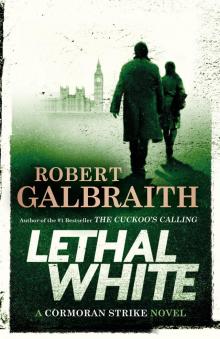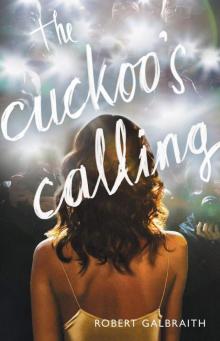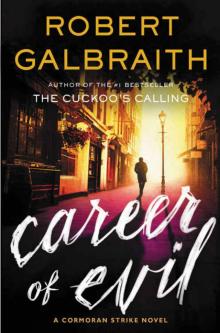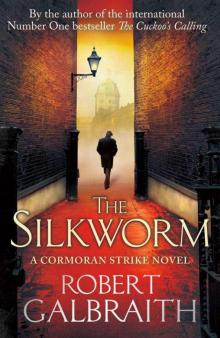- Home
- Robert Galbraith
Lethal White Page 16
Lethal White Read online
Page 16
Starting with the names that Wardle had given him, Strike had spent much of Monday researching, as best as he could, the two children the policemen had told him had vanished from the Oxfordshire area twenty years previously. Wardle had misspelled the boy’s first name, which had cost Strike time, but Strike had finally dug out archived press reports about Imamu Ibrahim, in which Imamu’s mother had asserted that her estranged husband had kidnapped the boy and taken him to Algeria. Strike had finally dredged up two lines about Imamu and his mother on the website of an organization that worked to resolve international custody issues. From this, Strike had to conclude that Imamu had been found alive and well with his father.
The fate of Suki Lewis, the twelve-year-old runaway from a care home, was more mysterious. Strike had finally discovered an image of her, buried in an old news story. Suki had vanished from her residential care home in Swindon in 1992 and Strike could find no other mention of her since. Her blurry picture showed a rather toothy, undersized child, fine-featured, with short dark hair.
Little girl it was, but after they said it was a little boy.
So a vulnerable, androgynous child might have disappeared off the face of the earth around the same time, and in the approximate area, that Billy Knight claimed to have witnessed the strangling of a boy-girl.
In the car, he composed a text to Robin.
If you can make it sound natural, ask Izzy if she remembers anything about a 12-year-old called Suki Lewis. She ran away 20 years ago from a care home near their family house.
The dirt on his windscreen shimmered and blurred in the rising sun as he left London. Driving was no longer the pleasure it had once been. Strike could not afford a specially adapted vehicle, and even though it was an automatic, the operation of the BMW’s pedals remained challenging with his prosthesis. In challenging conditions, he sometimes reverted to operating brake and accelerator with his left foot.
When he finally joined the M6, Strike hoped to settle in at sixty miles an hour, but some arsehole in a Vauxhall Corsa decided to tailgate him.
“Fucking overtake,” growled Strike. He was not minded to alter his own speed, having settled in comfortably without needing to use his false foot more than was necessary, and for a while he glowered into his rearview mirror until the Vauxhall driver got the hint and took himself off.
Relaxing to the degree that was ever possible behind the wheel these days, Strike wound down the window to admit the fine, fresh summer’s day and allowed his thoughts to return to Billy and the missing Suki Lewis.
She wouldn’t let me dig, he had said in the office, compulsively tapping his nose and his chest, but she’d let you.
Who, Strike wondered, was “she”? Perhaps the new owner of Steda Cottage? They might well object to Billy asking to dig up flowerbeds in search of bodies.
After feeling around with his left hand inside his provisions bag, extracting and ripping open a bag of crisps with his teeth, Strike reminded himself for the umpteenth time that Billy’s whole story might be a chimera. Suki Lewis could be anywhere. Not every lost child was dead. Perhaps Suki, too, had been stolen away by an errant parent. Twenty years previously, in the infancy of the internet, imperfect communication between regional police forces could be exploited by those wishing to reinvent themselves or others. And even if Suki was no longer alive, there was nothing to suggest that she had been strangled, let alone that Billy Knight had witnessed it. Most people would surely conclude that this was a case of much smoke, but no fire.
Chewing crisps by the handful, Strike reflected that whenever it came to a question of what “most people” would think, he usually envisaged his half-sister Lucy, the only one of his seven half-siblings with whom he had shared his chaotic and peripatetic childhood. To him, Lucy represented the acme of all that was conventional and unimaginative, even though they had both grown up on intimate terms with the macabre, the dangerous and the frightening.
Before Lucy had gone to live permanently with their aunt and uncle in Cornwall, at the age of fourteen, their mother had hauled her and Strike from squat to commune to rented flat to friend’s floor, rarely remaining in the same place more than six months, exposing her children to a parade of eccentric, damaged and addicted human beings along the way. Right hand on the wheel, left hand now groping around for biscuits, Strike recalled some of the nightmarish spectacles that he and Lucy had witnessed as children: the psychotic youth fighting an invisible devil in a basement flat in Shoreditch, the teenager literally being whipped at a quasi-mystical commune in Norfolk (still, for Strike’s money, the worst place that Leda had ever taken them) and Shayla, one of the most fragile of Leda’s friends and a part-time prostitute, sobbing about the brain damage inflicted on her toddler son by a violent boyfriend.
That unpredictable and sometimes terrifying childhood had left Lucy with a craving for stability and conformity. Married to a quantity surveyor whom Strike disliked, with three sons he barely knew, she would probably dismiss Billy’s story of the strangled boy-girl as the product of a broken mind, sweeping it swiftly away into the corner with all the other things she could not bear to think about. Lucy needed to pretend that violence and strangeness had vanished into a past as dead as their mother; that with Leda gone, life was unshakably secure.
Strike understood. Profoundly different though they were, often though she exasperated him, he loved Lucy. Nevertheless, he could not help comparing her with Robin as he bowled towards Manchester. Robin had grown up in what seemed to Strike the very epitome of middle-class stability, but she was courageous in a way that Lucy was not. Both women had been touched by violence and sadism. Lucy had reacted by burying herself where she hoped it would never reach her again; Robin, by facing it almost daily, investigating and resolving other crimes and traumas, driven to do so by the same impulse to actively disentangle complications and disinter truths that Strike recognized in himself.
As the sun climbed higher, still dappling the grubby windscreen, he experienced a powerful regret that she wasn’t here with him now. She was the best person he had ever met to run a theory past. She’d unscrew the thermos for him and pour him tea. We’d have a laugh.
They had slipped back into their old bantering ways a couple of times lately, since Billy had entered the office with a story troubling enough to break down the reserve that had, over a year, hardened into a permanent impediment to their friendship… or whatever it was, thought Strike, and for a moment or two he felt her again in his arms on the stairs, breathed in the scent of white roses and of the perfume that hung around the office when Robin was at her desk…
With a kind of mental grimace, he reached for another cigarette, lit up and forced his mind towards Manchester, and the line of questioning he intended to take with Dawn Clancy, who, for five years, had been Mrs. Jimmy Knight.
15
Yes, she is a queer one, she is. She has always been very much on the high horse…
Henrik Ibsen, Rosmersholm
While Strike was speeding northwards, Robin was summoned without explanation to a personal meeting with the Minister for Culture himself.
Walking in the sunshine towards the Department for Culture, Media and Sport, which stood in a large white Edwardian building a few minutes away from the Palace of Westminster, Robin found herself almost wishing that she were one of the tourists cluttering the pavement, because Chiswell had sounded bad tempered on the phone.
Robin would have given a great deal to have something useful to tell the minister about his blackmailer, but as she had only been on the job a day and a half, all she could say with any certainty was that her first impressions of Geraint Winn had now been confirmed: he was lazy, lecherous, self-important and indiscreet. The door of his office stood open more often than not, and his sing-song voice rang down the corridor as he talked with injudicious levity about his constituents’ petty concerns, name-dropped celebrities and senior politicians and generally sought to give the impression of a man for whom running a mere constituency o
ffice was an unimportant sideshow.
He hailed Robin jovially from his desk whenever she passed his open door, showing a pronounced eagerness for further contact. However, whether by chance or design, Aamir Mallik kept thwarting Robin’s attempts to turn these greetings into conversations, either interrupting with questions for Winn or, as he had done just an hour previously, simply closing the door in Robin’s face.
The exterior of the great block that housed the DCMS, with its stone swags, its columns and its neoclassical façade, was not reassuring. The interior had been modernized and hung with contemporary art, including an abstract glass sculpture that hung from the cupola over the central staircase, up which Robin was led by an efficient-seeming young woman. Believing her to be the minister’s goddaughter, her companion was at pains to show her points of interest.
“The Churchill Room,” she said, pointing left as they turned right. “That’s the balcony he gave his speech from, on VE Day. The minister’s just along here…”
She led Robin down a wide, curving corridor that doubled as an open-plan workspace. Smart young people sat at an array of desks in front of lengthy windows to the right, which looked out onto a quadrangle, which, in size and scale, bore the appearance of a colosseum, with its high white windowed walls. It was all very different from the cramped office where Izzy made their instant coffee from a kettle. Indeed, a large, expensive machine complete with pods sat on one desk for that purpose.
The offices to the left were separated from this curving space by glass walls and doors. Robin spotted the Minister for Culture from a distance, sitting at his desk beneath a contemporary painting of the Queen, talking on the telephone. He indicated by a brusque gesture that her escort should show Robin inside the office and continued talking on the telephone as Robin waited, somewhat awkwardly, for him to finish his call. A woman’s voice was issuing from the earpiece, high-pitched and to Robin, even eight feet away, hysterical.
“I’ve got to go, Kinvara!” barked Chiswell into the mouthpiece. “Yes… we’ll talk about this later. I’ve got to go.”
Setting down the receiver harder than was necessary, he pointed Robin to a chair opposite him. His coarse, straight gray hair stood out around his head in a wiry halo, his fat lower lip giving him an air of angry petulance.
“The newspapers are sniffing around,” he growled. “That was m’wife. The Sun rang her this morning, asking whether the rumors are true. She said ‘what rumors?’ but the fella didn’t specify. Fishing, obviously. Trying to surprise something out of her.”
He frowned at Robin, whose appearance he seemed to find wanting.
“How old are you?”
“Twenty-seven,” she said.
“You look younger.”
It didn’t sound like a compliment.
“Managed to plant the surveillance device yet?”
“I’m afraid not,” said Robin.
“Where’s Strike?”
“In Manchester, interviewing Jimmy Knight’s ex-wife,” said Robin.
Chiswell made the angry, subterranean noise usually rendered as “harrumph,” then got to his feet. Robin jumped up, too.
“Well, you’d better get back and get on with it,” said Chiswell. “The National Health Service,” he added, with no change of tone, as he headed towards the door. “People are going to think we’re bloody mad.”
“Sorry?” said Robin, entirely thrown.
Chiswell pulled open the glass door and indicated that Robin should pass through it ahead of him, out into the open-plan area where all the smart young people sat working beside their sleek coffee machine.
“Olympics opening ceremony,” he explained, following her. “Lefty bloody crap. We won two bloody world wars, but we’re not supposed to celebrate that.”
“Nonsense, Jasper,” said a deep, melodious Welsh voice close at hand. “We celebrate military victories all the time. This is a different kind of celebration.”
Della Winn, the Minister for Sport, was standing just outside Chiswell’s door, holding the leash of her near-white Labrador. A woman of stately appearance, with gray hair swept back off a broad forehead, she wore sunglasses so dark that Robin could make out nothing behind them. Her blindness, Robin knew from her research, had been due to a rare condition in which neither eyeball had grown in utero. She sometimes wore prosthetic eyes, especially when she was to be photographed. Della was sporting a quantity of heavy, tactile jewelry in gold, with a large necklace of intaglios, and dressed from head to foot in sky blue. Robin had read in one of Strike’s printed profiles of the politician that Geraint laid out Della’s clothes for her every morning and that it was simplest for him, not having a great feel for fashion, to select things in the same color. Robin had found this rather touching when she read it.
Chiswell did not appear to relish the sudden appearance of his colleague and indeed, given that her husband was blackmailing him, Robin supposed that this was hardly surprising. Della, on the other hand, gave no sign of embarrassment.
“I thought we might share the car over to Greenwich,” she said to Chiswell, while the pale Labrador snuffled gently at the hem of Robin’s skirt. “Give us a chance to go over the plans for the twelfth. What are you doing, Gwynn?” she added, feeling the Labrador’s head tugging.
“She’s sniffing me,” said Robin nervously, patting the Labrador.
“This is my goddaughter, ah…”
“Venetia,” said Robin, as Chiswell was evidently struggling to remember her name.
“How do you do?” said Della, holding out her hand. “Visiting Jasper?”
“No, I’m interning in the constituency office,” said Robin, shaking the warm, be-ringed hand, as Chiswell walked away to examine the document held by a hovering young man in a suit.
“Venetia,” repeated Della, her face still turned towards Robin. A faint frown appeared on the handsome face, half-masked behind the impenetrable black glasses. “What’s your surname?”
“Hall,” said Robin.
She felt a ridiculous flutter of panic, as though Della were about to unmask her. Still poring over the document he had been shown, Chiswell moved away, leaving Robin, or so it felt, entirely at Della’s mercy.
“You’re the fencer,” said Della.
“Sorry?” said Robin, totally confused again, her mind on posts and rails. Some of the young people around the space-age coffee machine had turned around to listen, expressions of polite interest on their faces.
“Yes,” said Della. “Yes, I remember you. You were on the English team with Freddie.”
Her friendly expression had hardened. Chiswell was now leaning over a desk while he struck through phrases on the document.
“No, I never fenced,” said Robin, thoroughly out of her depth. She had realized at the mention of the word “team” that swords were under discussion, rather than fields and livestock.
“You certainly did,” said Della flatly. “I remember you. Jasper’s goddaughter, on the team with Freddie.”
It was a slightly unnerving display of arrogance, of complete self-belief. Robin felt inadequate to the job of continuing to protest, because there were now several listeners. Instead, she merely said, “Well, nice to have met you,” and walked away.
“Again, you mean,” said Della sharply, but Robin made no reply.
16
… a man with as dirty a record as his!… This is the sort of man that poses as a leader of the people! And successfully, too!
Henrik Ibsen, Rosmersholm
After four and a half hours in the driving seat, Strike’s exit from the BMW in Manchester was far from graceful. He stood for a while in Burton Road, a broad, pleasant street with its mixture of shops and houses, leaning on the car, stretching his back and leg, grateful that he had managed to find a parking space only a short way from “Stylz.” The bright pink shopfront stood out between a café and a Tesco Express, pictures of moody models with unnaturally tinted hair in the window.
With its black and white
tiled floor and pink walls that reminded Strike of Lorelei’s bedroom, the interior of the small shop was determinedly trendy, but it did not appear to cater to a particularly youthful or adventurous clientele. There were currently only two clients, one of whom was a large woman of at least sixty, who was reading Good Housekeeping in front of a mirror, her hair a mass of foil. Strike made a bet with himself as he entered that Dawn would prove to be the slim peroxide blonde with her back to him, chatting animatedly to an elderly lady whose blue hair she was perming.
“I’ve got an appointment with Dawn,” Strike told the young receptionist, who looked slightly startled to see anything so large and male in this fug of perfumed ammonia. The peroxided blonde turned at the sound of her name. She had the leathery, age-spotted skin of a committed sunbed user.
“With you in a moment, cock,” she said, smiling. He settled to wait on a bench in the window.
Five minutes later, she was leading him to an upholstered pink chair at the back of the shop.
“What are you after, then?” she asked him, inviting him with a gesture to sit down.
“I’m not here for a haircut,” said Strike, still standing. “I’ll happily pay for one, I don’t want to waste your time, but,” he pulled a card and his driver’s license from his pocket, “my name’s Cormoran Strike. I’m a private detective and I was hoping to talk to you about your ex-husband, Jimmy Knight.”
She looked stunned, as well she might, but then fascinated.
“Strike?” she repeated, gaping. “You aren’t him that caught that Ripper guy?”
“That’s me.”
“Jesus, what’s Jimmy done?”
“Nothing much,” said Strike easily. “I’m just after background.”
She didn’t believe him, of course. Her face, he suspected, was full of filler, her forehead suspiciously smooth and shiny above the carefully penciled eyebrows. Only her stringy neck betrayed her age.

 Lethal White
Lethal White The Cuckoo's Calling
The Cuckoo's Calling Career of Evil
Career of Evil The Silkworm
The Silkworm